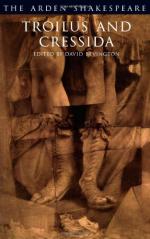|
This section contains 9,038 words (approx. 31 pages at 300 words per page) |

|
SOURCE: “‘Thou Art Chang'd’: Public Value and Personal Identity in Troilus and Cressida,” in Journal of Medieval and Renaissance Studies, Vol. 22, No. 2, Spring, 1992, pp. 237-59.
In the following essay, Mead suggests that the instability of the Renaissance economy is reflected in the metaphors of coinage used in Troilus and Cressida to describe the shifting moral stances and unreliable characters within the play.
There are two sorts of wealth-getting … that which consists of exchange is justly censured; for it is unnatural, and a mode by which men gain from one another.
—Aristotle, Politics
As a dramatist and businessman, Shakespeare knew the vagaries of the theater business and the shifting faces of currency in the Elizabethan economy. Even in a period in which money was a frequent topic on the stage, Shakespeare distinguishes himself by using terms of coinage, currency, exchange rates, counterfeiting, and minting practices to dramatize the mutability...
|
This section contains 9,038 words (approx. 31 pages at 300 words per page) |

|


